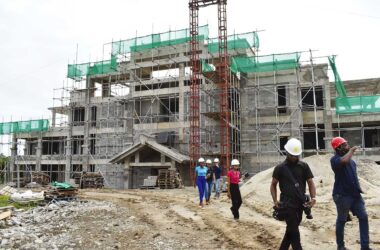
The momentum driving government’s efforts to establish a national minimum wage for workers is crackling with energy and focus says the Chairperson of the Commission, veteran unionist Lawrence Poyotte.
The Commission met as recently as Friday, May 12, 2023 along with the Minister for Labour Dr. Virginia Albert-Poyotte, to articulate the progress already achieved and to harness the necessary support for moving ahead.
Poyotte noted that the Commission has been meeting since September 2022 on an average of twice a month. He says although not at liberty to make any public disclosures, he can confirm that a scientific method is being used to arrive at the proposed minimum wage.
“We have made significant progress and we should be in a position to make a recommendation to the minister. Basically, we had a consultation with the minister to see how we can strengthen the work of the Commission. We’re using a methodology that was developed by the OECD and ILO normally referred to as the Kaitz Formula,” Poyotte said. (This term is also known as the Kaitz Ratio or Index, which is used by many countries to determine the median or minimum wage).
Poyotte explained that this formula could lead to a sound figure, once it is applied to locally available data.
The Minimum Wage Commission comprises a cross-section of representatives for employers, trade unions, and persons appointed by the minister, on the advice of Cabinet. The Minimum Wage Commission is expected to remain functional even after the Cabinet of Ministers has approved a historic minimum wage for Saint Lucia.














What’s better for workers than a higher minimum wage? A tax on vacant land and unoccupied premises. A higher minimum wage discourages hiring (not to be confused with encouraging firing). But a vacancy tax on residential property makes the owners get residential tenants (and set the rents within reach of wages), while a vacancy tax on commercial property makes the owners get business tenants, who in turn will need workers, leading to higher market wages and more stable jobs.
What’s better for business than a lower minimum wage? A tax on vacant land and unoccupied premises! A lower minimum wage cuts the spending power of prospective customers, and makes it harder for prospective employees to afford housing within a manageable distance of your business. But a vacancy tax on nearby residential property keeps it populated with prospective customers and workers, while a vacancy tax on nearby commercial property keeps it populated with complementary businesses that will attract foot traffic to your business.
Notice that a vacant-property tax is meant to be AVOIDED. It’s not meant to be paid. Better still, avoidance of it would generate economic activity, expanding the bases of other taxes and allowing their rates to be cut, so that both workers and businesses would pay LESS tax!